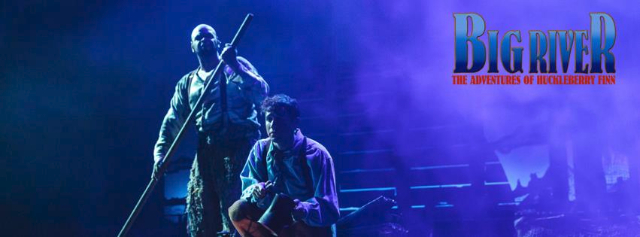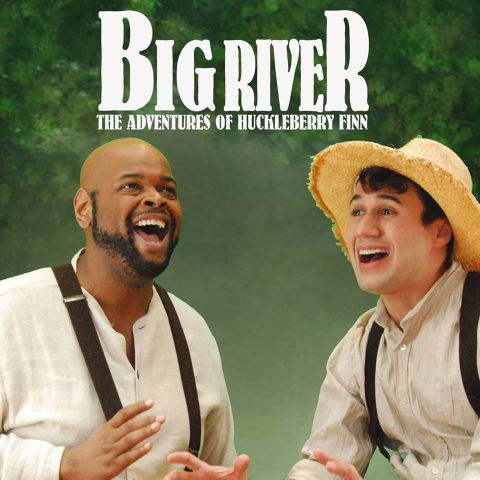Big River the Adventures of Huckleberry Fin Torrance Performing Arts Center
![]()
Huck Finn Stage Adaptation in Ft. Lauderdale
Boring Burn Theatre Visitor Sets Marking Twain to Music

Brian Maurice Kinnard and Ricky Cona.

Brian Maurice Kinnard and Ricky Cona.
Ft. Lauderdale-based Deadening Burn Theatre Company demonstrates why it received 12 Carbonell Award nominations this yr through its strong production of "Big River: The Adventures of Huckleberry Finn."
It's easy to gloss over the musical'due south flaws with the talent on display on the Broward Center for the Performing Arts' Amaturo Theater stage through April 2.
Powerful, rangy and expressive singing voices, backed by a solid, never overpowering alive orchestra, blend with convincing, multi-faceted performances and vivacious dancing to create a touching, funny and electric production, nether Patrick Fitzwater'due south detailed, sensitive direction and smart staging.
"Big River," based on Mark Twain'south honey archetype, "The Adventures of Huckleberry Finn," is the kind of musical whose songs brand you yearn for a cast album the fashion theatergoers long for a ticket to "Hamilton."
The Bluegrass, Country, Honky Tonk and Gospel-flavored score isn't simply sung, merely acted out by this large, first-rate bandage. Its members never sing to testify off their voices, but to convey the emotion backside the songs. They succeed mightily.
Yous'll never confuse Miller's lyrics with those of Stephen Sondheim or Oscar Hammerstein. Miller's lyrics in "Large River" are often repetitive, corny and some songs don't serve the story.
One could ax a scattering of songs that add adjacent to nada and nevertheless preserve this faithful stage adaptation of Twain's humorous, classic, wordy novel.
On opening night, non counting intermission, the production ran about 2 hours and 30 minutes, mainly due to the unnecessary songs (we don't need to hear some unnamed fool tout his beloved country of Arkansas past repetitively mentioning the land's name.) Again, information technology doesn't serve the story, but unnecessarily lengthens the show. Likewise for the corny "Hand for the Hog."
The patter-similar song "Imperial Nonesuch" is at least a nice tongue-twisting challenge for the actors, and they don't miss a beat, eliciting laughs without begging for them.
There are strengths to this score. It would exist hard to recollect of a more-timely song than "Guv'ment," sung past Pap Finn, Huckleberry's drunken bum of a male parent. Some of the nonsensical lyrics reinforce the uneducated man's mode of speech. They also lambaste government, something people seem to be doing a lot these days.
Well, you dad-glue authorities
You pitiful so 'due north' so'southward
You got your damn hands in every pocket
Of my apparel.
In our Trumpian America, some may fear information technology won't be long before the electric current assistants has its hands also close for our comfort.
Performing the song is an unshaven Troy J. Stanley, looking unkempt with long hair and dirt-streaked wearing apparel (the period, character-fitting costumes were designed by Rick Pena).
A broad-eyed Stanley, singing and speaking in a coarse vocalisation and thunderously shouting at times, gives us an unpredictable Pap. He'due south menacing one moment, sarcastic and showy the adjacent. The actor too imbues Pap with a shred of humanity and vulnerability when the character feels shameful.
While the less-than-eloquent lyrics in "Guv'ment" are graphic symbol-revealing, that'south even more true with Huckleberry'due south "I, Blueberry, Me" -- a song in which Miller makes the lad's traits clear. The carefree, mildly defiant melody matches the character-defining lyrics.
Ricky Cona, a college graduate with a adolescent demeanor, could pass for Huckleberry'southward historic period. He is nimble on his feet while singing the song with a costless-spirited, unapologetic aura.
Cona imbues the boy with determination, a sensitive amuse and just plenty mischievousness to convince united states of america he'south a kid. The immature actor's slanted eyebrows deftly conveys a variety of feelings, from innocence and curiosity to concern every bit Huck struggles through his inner conflict. Grandmothers in the audience volition probably want to ascend the phase and pinch Cona's cheeks. His heart melting Huckleberry makes you feel how torn the boy is between preventing runaway slave Jim's capture and revealing his whereabouts.
1 cannot arraign Huckleberry for his racist attitude and use of the "N" word. He was brought upwards during a time when slavery and that word were every bit commonplace as words nosotros use everyday today. In that location'southward something particularly heart-tugging about an innocent youth struggling with his conscience and, through his good-naturedness, realizing an injustice is taking identify. All this comes across conspicuously in Cona's performance, which further endears united states of america to Huckleberry.
We find ourselves rooting not simply for Huck, but Jim (an fantabulous Brian Maurice Kinnard), to unite forever in friendship. We're made to realize, however, that though they've become skilful friends, they're "Worlds Apart." (the title of a gentle, hopeful song.)
As folks living in 2017, nosotros at least like to think we've significantly narrowed that gap from the pre-civil state of war era in which "Big River" takes place. Merely we're realizing that with today's racial tension and violence, we, equally people of different races, have practically reverted to being if non "Worlds Apart," than likewise far apart.
That gap exists due in role to shady characters such as the "Knuckles" and the "King." Sure, these men, in the novel and stage adaptation, serve every bit comic relief. But they also recap the type of people who would employ blackmail and con their style into destroying lives for their selfish purposes.
Victor Souffrant, every bit the "Duke," masks his evil intent nicely. The thespian demonstrates a flair for the dramatic and endows him with a flamboyancy that offers plenty of comic relief. Sure, Souffrant shows off, but part of the sense of humor in "Big River" and its source material rests in the fun it has with the theater and exaggerated acting. This story, you might say, is somewhat of a love letter to the theater.
There's nothing to dear about "The King," a ruthless con. There's a cunning, menacing quality to Matthew Korinko's "King," a nice contrast to Souffrant'southward buffoonish, showy "Duke."
Kinnard shines as Jim, investing him with verve and a positive attitude. Kinnard's Jim never broods or resorts to self-compassion. His energetic rendition of the show stopper "Muddied Water," a repetitive but spirited song, is filled with optimism and infectious joy. Kinnard also endows Jim with palpable heartache during a scene in which he talks nearly his children.
In this and other productions of "Big River" I've seen, Jim comes across as much more articulate than in the novel and Kinnard honors that. It would be tedious for an audience to sit down through the unabridged play, listening to and trying to understand the dialect Twain gave Jim in the novel.
The same actors and the rest of this fine bandage fully inhabit their roles on scenic designer Sean McClelland's prepare, consisting of wooden boards and a platform that serves every bit the raft. Fog rise from the ground, coupled with Rebecca Montero's lighting and at times blue properties, help to suggest a river.
This big body of water essentially becomes a character and a symbol. It's symbolic of Jim's journeying toward liberty. But it's also Huck'due south journey toward liberating his conscience and coming to understand the attitudes of his fourth dimension in a different light.
Dive correct in to this ever-timely, entertaining and touching tale, told admirably by an impressive Slow Burn cast.
Source: https://www.berkshirefinearts.com/03-17-2017_huck-finn-stage-adaptation-in-ft-lauderdale.htm
0 Response to "Big River the Adventures of Huckleberry Fin Torrance Performing Arts Center"
Post a Comment